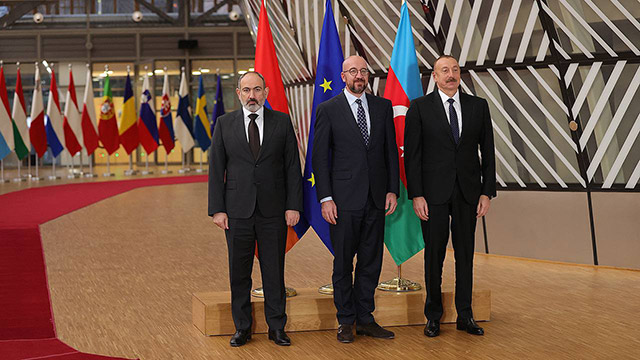“One of the topics of the discussion was the issue of opening regional communications, around which we recorded some misunderstandings and agreed to continue working to find solutions”
The regular Cabinet meeting took place today, chaired by Prime Minister Nikol Pashinyan.
Before discussing the agenda, the Prime Minister summed up the results of the trilateral meeting between him, the President of the European Council and the President of Azerbaijan, which took place on April 6 in Brussels. In his speech, Nikol Pashinyan particularly said,
Read also
“Dear participants of the Cabinet meeting,
Dear compatriots,
First of all, let me congratulate all the women present at the meeting and all women on the occasion of Motherhood and Beauty Day. I suggest to salute them with applause [applause]. Thank you.
Dear attendees,
You are aware that under the mediation of the President of the European Council Charles Michel, the meeting between me and the President of Azerbaijan took place in Brussels yesterday until late night through. Based on the results of the meeting, decisions were made over two issues. First, the foreign ministers of the two countries have been instructed to begin preparations for the future peace treaty, to hold talks and establish contacts in this direction. What does this mean? This means that the principles and issues presented by Armenia and Azerbaijan on the peace treaty should be summed up and be addressed based on the results of the negotiations.
In my speech at the previous Cabinet meeting, I raised our considerations in this regard. You are aware that in response to Azerbaijan’s proposals, we have emphasized that there is nothing unacceptable for us, but they do not generalize all the issues on the peace agenda, and the security guarantees of the people of Nagorno Karabakh, the protection of their rights and freedoms, as well as the clarification of the final status of Nagorno Karabakh are of fundamental importance for us. These issues are included in our response to the peace agenda and they should become subject of negotiations. Of course, as before, we consider the involvement of the OSCE Minsk Group Co-Chairs essential in this process, and we must continue to work in that direction.
Naturally, there was a discussion about the deterioration of the security environment in Nagorno Karabakh, particularly the events in Parukh, but those discussions did not lead to a joint assessment of the situation. I must also say that I did not consider the further discussion of this particular topic appropriate in the Brussels platform, because, nevertheless, it is about the intrusion of Azerbaijani units into the responsibility zone of the Russian peacekeeping mission in Nagorno Karabakh, and we should discuss this issue with the participation of our partners of the Russian Federation, which we do and will continue to do. I have published our position on this issue. Accordingly, we expect that the peacekeepers of the Russian Federation in Nagorno Karabakh will take measures to ensure the withdrawal of Azerbaijani units from the zone of their responsibility.
We also consider it important to conduct an investigation into the activities of the Russian peacekeeping forces, the adequacy of their actions, and possible inaction during the course of the developments, about which I spoke during my telephone conversations with the President of the Russian Federation Vladimir Putin.
Returning to the Brussels meeting, let me inform you that the next decision that was made was about setting up a bilateral commission on delimitation of the Armenia-Azerbaijan border by the end of April. That commission will have a double mandate. The first is delimitation. Second, ensuring security and stability along the border. Discussions on this issue, you remember, including through the mediation of the Russian Federation, have been going on for about a year, and finally we came to such a compromise decision.
You know that there are territories of the Republic of Armenia that are under the control of Azerbaijan, there are territories of Azerbaijan that are under the control of Armenia, these issues must be resolved through negotiations, of course, on the basis of de jure substantiated records and legally grounded facts.
The Russian Federation has expressed readiness to support the delimitation and demarcation work. The European Union is also ready to support, we must move in this direction. You know that our position is that there is a de jure border between Armenia and Azerbaijan, and that is the border that existed in Soviet times. With this consideration, it’s necessary to start the delimitation works and try to reach solutions, taking parallel measures to ensure security and stability.
One of the topics of the discussion was the issue of opening regional communications, around which we recorded some misunderstandings and agreed to continue working to find solutions.
Humanitarian issues were one of the important topics of the discussion. The President of the European Council stressed the need to release all those held captive. We also discussed the possibility of cooperating to find out the fate of missing persons. Let me remind you that after the two Artsakh wars, we have 985 missing persons, 208 from the 44-day war, 777 people from the first Artsakh war. We must continue to work to find out their fate.
Dear colleagues,
Dear people,
If I give a general assessment of the Brussels meeting, I must state that an agreement was reached to move forward in both directions. The further assessment, of course, depends on the results to be achieved during the practical implementation of the agreements. We will consistently continue to advance our agenda of opening an era of peaceful development for our country and the region, and we must do our utmost to make this agenda a reality. I repeat, unfortunately, it does not depend only on us, but we must do our part consistently.
Thank you. This is all about the Brussels meeting”.
INFORMATION AND PUBLIC RELATIONS DEPARTMENT OF THE OFFICE OF THE PRIME-MINISTER OF THE REPUBLIC OF ARMENIA





















































